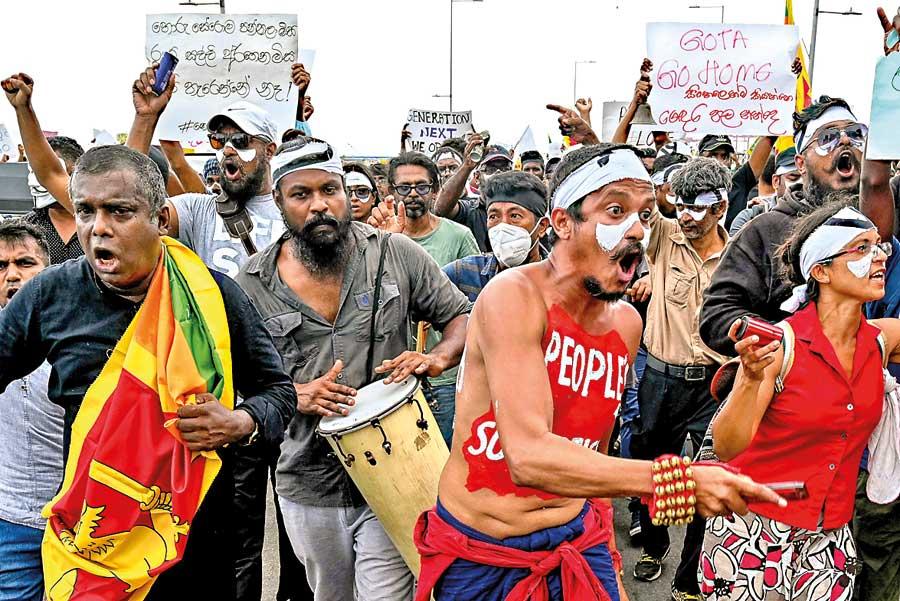01 Feb 2023 - {{hitsCtrl.values.hits}}

Picture shows angry and concerned citizens joining in the agitation campaign carried out against the government (Picture AFP)
 The report also documents how President Ranil Wickremesinghe imposed sweeping restrictions on peaceful assemblies The report also documents how President Ranil Wickremesinghe imposed sweeping restrictions on peaceful assemblies |
 The authorities also imposed unnecessary and disproportionate restrictions on assemblies through the use of emergency powers and the abuse of laws The authorities also imposed unnecessary and disproportionate restrictions on assemblies through the use of emergency powers and the abuse of laws |
Sri Lanka’s protest movement, also known as the aragalaya (struggle) born in response to the government’s protracted economic mismanagement and growing public discontent on corruption and nepotism has become a case study, locally and globally. But even though Sri Lankans are constitutionally entitled to the Right to peaceful assembly, state and law enforcement authorities proved otherwise.
 Continuous crackdown on protesters was condemned by various local and international human rights organizations and respective organizations called upon the then government to act in accordance with international human rights treaties that Sri Lanka is a signatory to. In a newly released report, the International Federation for Human Rights (FIDH) documents how the state has continued to violate General Comment 37 on Article 21 of the International Covenant on Civil and Political Rights (ICCPR).
Continuous crackdown on protesters was condemned by various local and international human rights organizations and respective organizations called upon the then government to act in accordance with international human rights treaties that Sri Lanka is a signatory to. In a newly released report, the International Federation for Human Rights (FIDH) documents how the state has continued to violate General Comment 37 on Article 21 of the International Covenant on Civil and Political Rights (ICCPR).
The 60-page report titled ‘Anatomy of a Crackdown – The repression of Sri Lanka’s aragalaya Protest movement’ is released ahead of Sri Lanka’s fourth Universal Periodic Review (UPR), which will take place on 1 February 2023 in Geneva, Switzerland. The UPR is a UN-backed peer review of the human rights record of all UN member states. This report, which has been produced with the support of the Center for Human Rights and Development (CHRD), is based on interviews conducted by FIDH with a total of 42 people (32 men and 10 women) between August and October 2022.In July 2022, in their joint submission for the UPR, FIDH and CHRD detailed numerous human rights violations, including violations of the right to freedom of peaceful assembly.
The core of the report highlights on relentless repression carried out by authorities including the imposition of unnecessary and disproportionate restrictions on the right to freedom of peaceful assembly through the declaration of a State of Emergency and the adoption of Emergency Regulations.
“The invocation of emergency powers by Sri Lanka’s Presidents to quell public protests was unnecessary and unjustified. Under Article 4 of the ICCPR, a declaration of a State of Emergency should only be made in response to a situation that “threatens the life of the nation.” According to the UN Human Rights Committee’s General Comment No. 37 on Article 21 of the ICCPR, restrictions on the right to freedom of peaceful assembly on the grounds of “interest of national security” may be invoked to protect the “existence of the nation, its territorial integrity or political independence against a credible threat or use of force. “Such thresholds were never met by the aragalaya protests,” the report reads.
The report also documents how President Ranil Wickremesinghe imposed sweeping restrictions on peaceful assemblies by declaring areas surrounding the Parliament Complex, Presidential Secretariat, the President’s and Prime Minister’s official residences, the Prime Minister’s Office and other areas in Colombo as High Security Zones. “The sweeping prohibition of assemblies in public places is inconsistent with General Comment No. 37, which states that there can be no “blanket ban on all assemblies in the capital city [...] or on all the streets in a city.” Moreover, the General Comment states that blanket restrictions on peaceful assemblies are “presumptively disproportionate,” the report further states.
The deployment of military to police protests, misinterpretation of the Police Ordinance, lack of adequate human rights training for police officers deployed to control crowds, shoot-on-sight orders and threats to the right of life too have been observed in this report.
“In their crackdown on the aragalaya, Sri Lankan authorities systematically violated the international human rights law and standards with complete impunity. President Wickremesinghe’s recent pledge to use the military and emergency powers to prevent the resurgence of a protest movement should sound alarm bells. It is imperative the international community remains vigilant and presses the government to respect and protect the rights of protesters,” said FIDH Secretary-General Adilur Rahman Khan.
The authorities also imposed unnecessary and disproportionate restrictions on assemblies through the use of emergency powers and the abuse of laws, including the draconian Prevention of Terrorism Act (PTA). Amid these violations, members of law enforcement agencies have not been held accountable for abuses they committed against
aragalaya protesters.
The FIDH therefore calls upon the government to implement its recommendations to uphold the right to freedom of peaceful assembly in a manner consistent with its international human rights obligations. Some of its key recommendations are:
By clicking the link given
below readers can have access to the full report by the FIDH.
https://www.fidh.org/en/region/asia/sri-lanka/sri-lanka-anatomy-of-a-crackdown
25 Nov 2024 16 minute ago
25 Nov 2024 18 minute ago
25 Nov 2024 19 minute ago
25 Nov 2024 27 minute ago
25 Nov 2024 27 minute ago